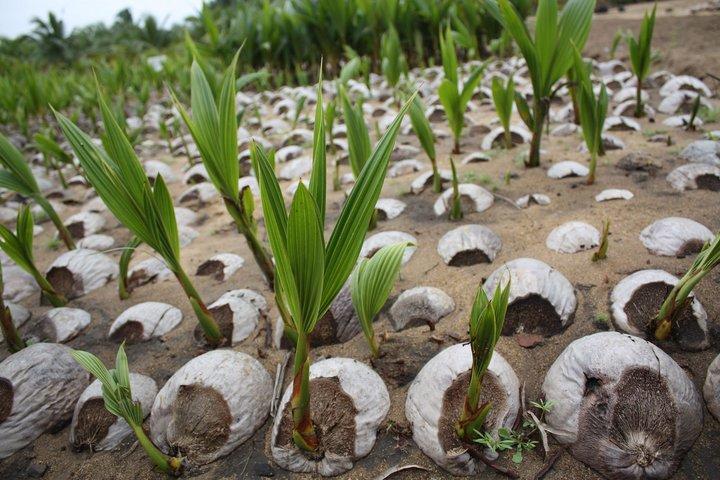Saving the Pacific's coconuts

Coconut-producing countries and international organizations will meet in Fiji from 31st October to 4th November 2017 to discuss the future of coconut genetic resources conservation.
Coconut-producing countries and international organizations will meet in Fiji from 31st October to 4th November 2017 to discuss the future of coconut genetic resources conservation.
The Steering Committee of the International Coconut Genetic Resources Network (COGENT) will meet with other international coconut stakeholders at the Tanoa International Hotel, Nadi, Fiji, from the 31st October to 4th November 2017, to determine how best to sustain the conservation and use of coconut genetic diversity for the Asia-Pacific region and globally.
The workshop will i) finalise and launch a new Global Strategy for Conservation and Use of Coconut Genetic Resources(the Strategy), particularly exploring how this relates to the Pacific region; ii) help assure the technical and organizational underpinning for conservation and use of coconut genetic diversity in the Pacific and globally, and iii) marshal international efforts to address key biotic (pests and diseases) and abiotic (climate change) threats to coconut diversity in the Pacific.
Apart from its obvious importance to Fiji and the Asia-Pacific region (which accounts for 80% of global production), coconut is grown in around 100 tropical countries, on more than 12 million hectares and by countless homesteads, and is culturally and economically important to many millions of smallholder households. Annual global output is estimated at around 61 million tonnes (copra, coir, water and oil), with a gross value of more than US$50 billion.
Coconut diversity is conserved as around 1,500 accessions in 24 field genebanks across the world, which face various threats. The future of coconut production and associated livelihoods critically depends on growers having ready access to the broad genetic diversity of this crop. Most plantations’ and smallholders’ palms are senile and relatively unproductive, and need replanting. Many growers do not even know what variety they have planted, nor how to best replace their old palms with elite and disease-free planting material, that will fulfill their needs in terms of productivity and quality, and traits to resist climate change, droughts and pest and diseases. We need to plant more than 700 million palms to replace senile stocks, and further investment is needed to build coconut stakeholders’ capacity and resources across the value-chain, particularly for genetic resources conservation. In addressing these challenges, the Strategy marks a route to enhanced well-being for millions of coconut smallholders across the globe.
Representatives from the Fijian government and the Pacific Community will inaugurate the meeting. The Pacific Community (SPC) is co-hosting the meeting, which is being held directly after the Asia Pacific Coconut Community (APCC) Ministerial Session in Kiribati, and the Pacific Week of Agriculture in Vanuatu. The following week, a meeting in Samoa, supported by the UK’s Darwin Initiative, will look at technical issues associated with identifying and conserving coconut diversity in the Pacific region.
The 27 participants in the COGENT meeting will represent 12 coconut-growing countries (Fiji, India, Indonesia, Ivory Coast, Jamaica, Mexico, Papua New Guinea, Philippines, Samoa, Sri Lanka, Tanzania and Tonga) and six international organizations: the Australian Centre for Agricultural Research (ACIAR), APCC (Indonesia), Bioversity International/CGIAR (France and India), CIRAD (France and New Caledonia), the Global Crop Diversity Trust (Germany) and SPC (Fiji). Sri Lanka will be represented by the COGENT SC Chair Dr Lalith Perera, Deputy Director Research of the Sri Lankan Coconut Research Institute (CRI), and Brazil by the Vice Chair, Dr Marcelo Ferreira Fernandes of EMBRAPA. The International Treaty on Plant Genetic Resources for Food and Agriculture (ITPGRFA), will attend remotely as the 7th Session of the Governing Body is taking place the same week in Kigali, Rwanda.
The 39 COGENT member countries gratefully acknowledge the support of ACIAR, Australia’s Department of Foreign Affairs and Trade (DFAT), APCC, Bioversity international, CIRAD, the Fijian Government, SPC and the UK Darwin Initiative.
Relevant information:
AGENDA | THE COCONUT CONSERVATION STRATEGY
Venue: Tanoa International Hotel, Votualevu Road Nadi Airport, Nadi, Fiji
Date: 31st October to 4th November 2017
Tel: Hotel Tanoa International: +679 6720277, or Mrs Reapi Masau (SPC): +9251901
If external participants wish to attend any of the open sessions or know more contact: [email protected] or via the above contact numbers.
APCC: http://www.apccsec.org/cocotech-2014.html
Bioversity International http://www.bioversityinternational.org/
CGIAR http://www.cgiar.org/
CIRAD http://www.cirad.fr/
COGENT http://www.cogentnetwork.org/
CRI http://www.cri.gov.lk/web/index.php?lang=en
Global Crop Diversity Trust www.croptrust.org
SPC www.spc.int
UK Darwin Initiative http://www.darwininitiative.org.uk/
Photo: Coconuts growing in Fiji. Credit: Global Crop Diversity Trust
